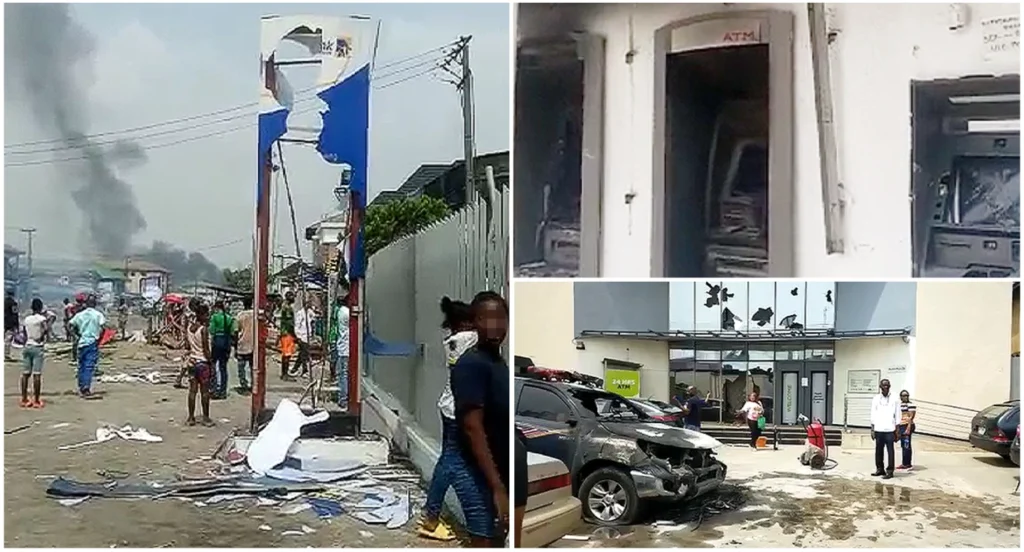Another round of protests have broken out in several states across the country, including Oyo, Delta, and Edo, over the scarcity of the new N200, N500, N1,000 notes and rejection of the old naira bills.
This comes less than two weeks after residents of Ibadan, Oyo State took to the streets in protest against the hardship triggered by the naira notes swap and fuel price hike.
Violent demonstrations were held on Wednesday in Ibadan and Udu, near Warri, the commercial hub of Delta State.

The protests were in reaction to banks nationwide refusing the old currency in line with a position taken by the Central Bank of Nigeria (CBN), although the Supreme Court had ruled that the apex bank’s February 10 deadline be suspended temporarily.
The position has since led to a standoff between the CBN and the governors of various states, including Kano and Ogun.
There were demonstrations in different parts of Ibadan, such as Mokola, resulting in a gridlock along Eleyele/Eruwa road.
Cars were turned back at some point while some schoolchildren were forced to return home as a result of the protest.
Commercial activities were grounded as the Mokola Road was turned into a football field.
Most major roads were deserted as many residents resorted to trekking long distances.

Some fish sellers took their protest to a private radio station in Ibadan, claiming that they sold all their products on Tuesday, accepting the old notes but on getting to the strongrooms to their bank to deposit the funds, no one was willing to sell to them.
Crowds were seen in front of the CBN office at Dugbe waiting to be attended to in the bid to change old naira notes amid heavy security presence.
In Delta, the ongoing rampage blocked the major highway with bonfires and other objects at their disposal, destroying automated teller machines (ATMs) belonging to some banks in the area.
Angry youths protested the scarcity of the new redesigned naira notes and the rejection of the old notes by people.
The demonstrations first broke out at Orhuwhorun junction before spreading to the expressway.
Part of the buildings of banks were vandalised by the mob who hurled stones and other objects at the premises, priompting bank workers and their customers to scamper for safety.
Meanwhile, the Delta State Governor, Ifeanyi Okowa has appealed for calm and patience.
Okowa’s appeal was contained in a statement by the state Commissioner for Information, Charles Aniagwu.
He called on the people to remain calm while also appealing to the Central Bank of Nigeria (CBN) and the monetary authorities to take further steps in increasing the money supply in the system.
“We appeal to our brothers and sisters across the state to keep calm in spite of the current travails they are going through as a result of the scarcity of naira notes in the country,” the statement read in part.
“As a government, we are not unaware of your sufferings but we appeal to you to be patient with the monetary authorities as they take steps to improve the money supply in the country.
“We are very much aware of your pains and concerns, but burning down a bank that employs our people will not augur well for us as a nation even as it will not also solve the problem but will further compound the situation.
“Once again, we appeal to you all to sheath your swords while we continue to engage the cbn to ensure more funds are released to the banks in the country.”
The governor’s appeal comes on the heels of protests by some citizens of the state at Orhuwhorun community in Udu Local Government Area (LGA) of the state where a bank’s ATM gallery was reportedly torched.
A crowd of aggrieved residents were protesting on Akpakpava road in Benin City, the Edo State capital against the inability to access cash in banks.
The road was closed to traffic as tyres were burnt in the middle of the road
The Supreme Court of Nigeria on Wednesday adjourned the case on the naira swap policy of the Central Bank of Nigeria (CBN) till February 22 for hearing of the consolidated suits by 10 states.
The court joined Katsina, Lagos, Cross Rivers, Ogun, Ondo, Ekiti, and Sokoto States as co-plaintiffs in the suit challenging the Naira Redesign policy of the Federal Government.
Similarly, the apex court joined Edo and Bayelsa states in support of the Federal Government on implementation of the naira swap policy.
The six states in their respective motions for joinder pitched their tents with the three aggrieved states, Kaduna, Zamfara, and Kogi states that initially ignited the suit.

